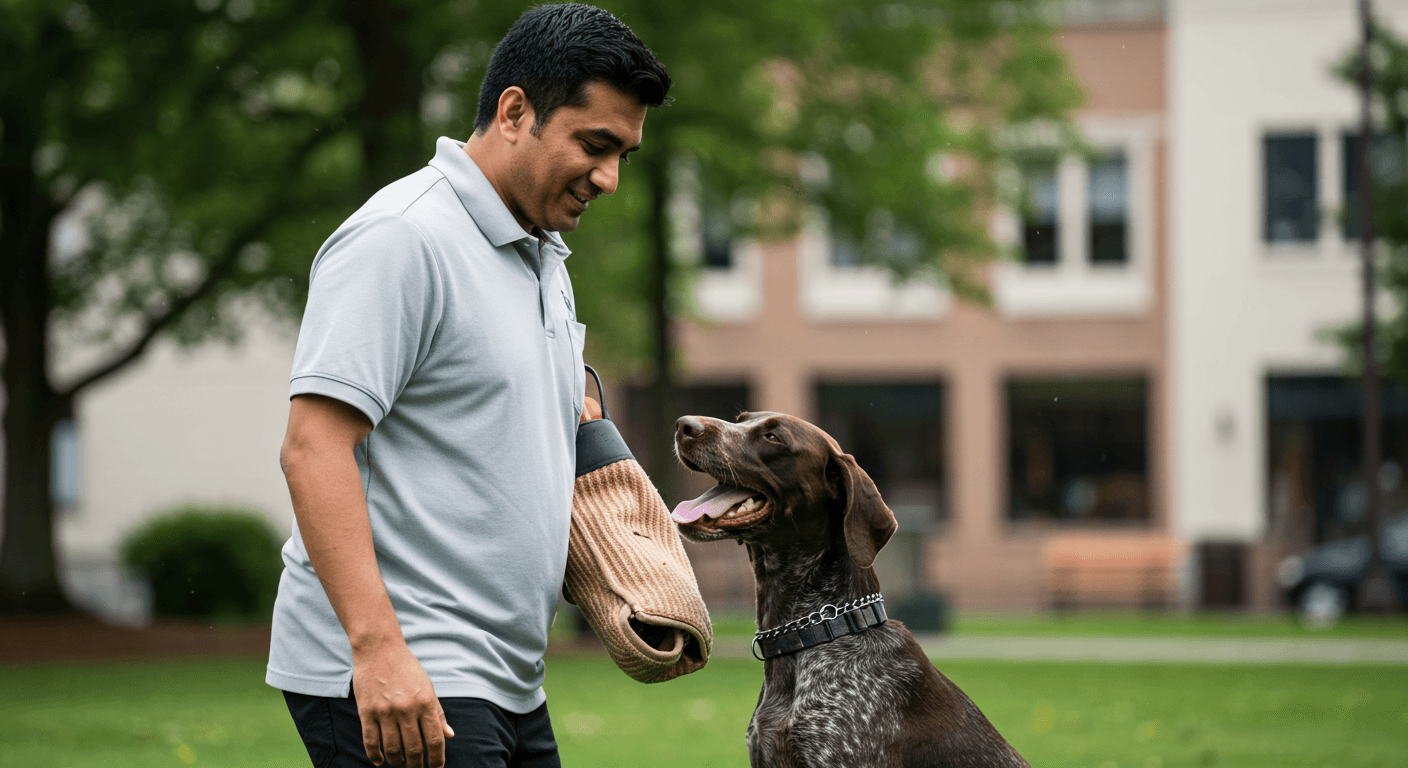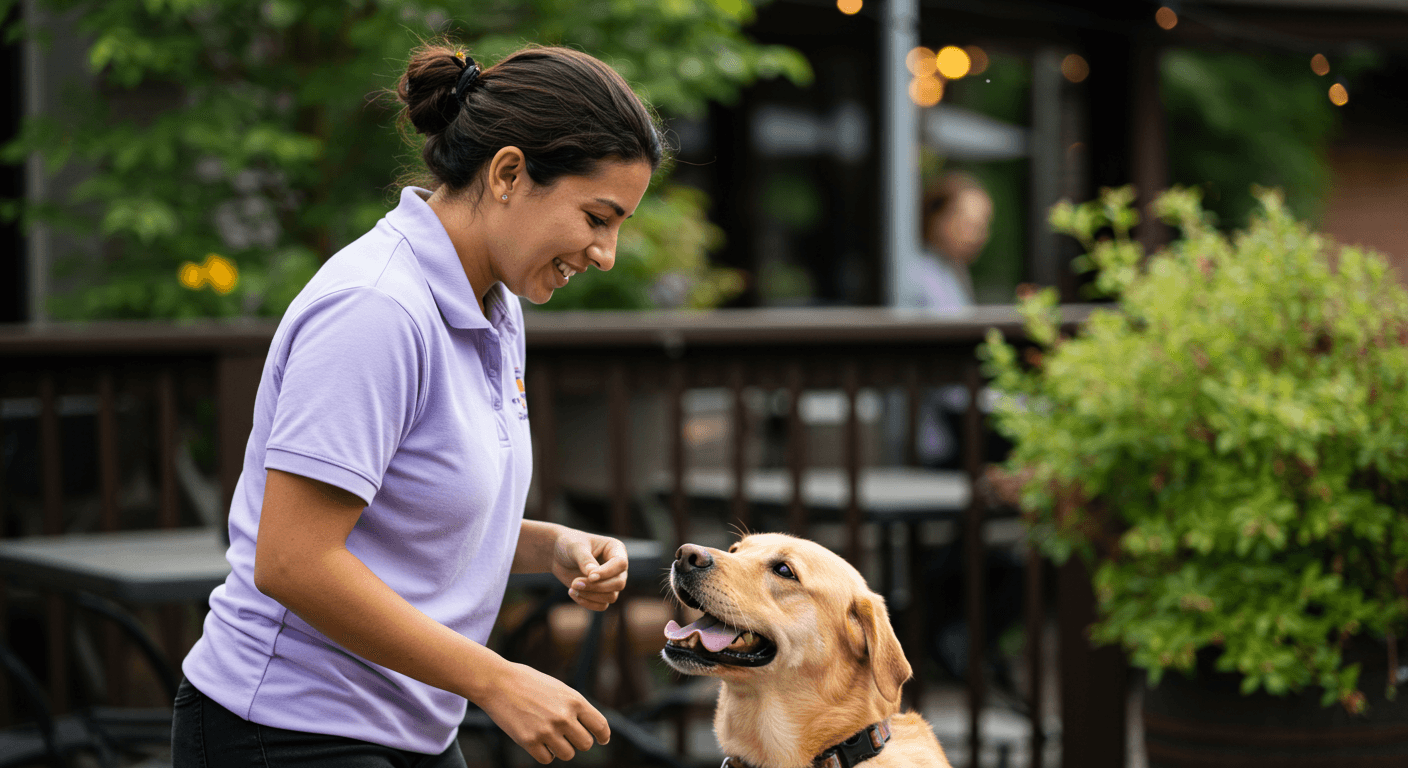Your Complete Guide to Choosing a Dog Trainer in Quincy and Surrounding Areas
Living with a dog in Quincy means navigating wide open spaces, agricultural areas, and a tight-knit rural community where your dog needs reliable skills. Whether you’re walking through local neighborhoods, visiting nearby parks, or managing farm life with livestock around, your dog needs to respond to commands even with distractions.
Quincy sits in Grant County, which brings specific considerations for dog owners in this central Washington agricultural hub. When you find a trainer who understands rural living and the unique challenges of this area, you’ll get better results both at home and around town.
How to Choose the Right Trainer
Start by looking for someone who uses positive reinforcement training and understands the specific needs of dogs living in rural Grant County. Your dog should learn to stay calm around farm animals, respond reliably to recalls in open spaces, and handle the occasional trip to town without pulling or jumping on people.
Credentials give you a quick way to compare trainers’ experience levels. Common dog trainer certifications include KPA-CTP, CPDT-KA, or IAABC-CDBC for behavior problems. If your dog has serious aggression issues, look for someone with CBCC-KA or a science-based program like CTC.
In-home dog training works especially well in Quincy because trainers can help you address real-life challenges like property boundaries, farm animal distractions, and managing your dog in wide open yards. Private lessons let you focus on exactly what matters for your lifestyle, whether that’s recall training on acreage or teaching calm behavior around livestock.
Group classes make sense once your dog can focus around other dogs, but many Quincy residents find that in-home sessions better fit their rural setting and specific needs.
Common Dog Training Methods Explained

Reward-based methods build the trust you want while creating lasting behavior changes. They work especially well for teaching impulse control around farm animals and wildlife common in Grant County.
Basic obedience covers sit, down, stay, place, recall, and leash training so your dog can handle trips to local businesses, walks through town, and property management without problems. Strong recall is especially important when you have acreage and need your dog to come back reliably.
Puppy training focuses on socialization, potty training, bite control, crate comfort, and early leash skills. Starting early prevents bad habits and helps rural puppies learn appropriate behavior around all the distractions they’ll encounter on a farm or ranch.
Behavior modification addresses fear, reactivity, resource guarding, or separation anxiety through careful desensitization and counterconditioning. If you’re dealing with livestock chasing or predatory behavior, a professional dog trainer with experience in rural settings becomes essential.
Dog training classes work well for socialization and practicing good manners around other dogs and people. The best classes give dogs plenty of space, screen participants carefully, and teach calm behavior rather than just excitement.
Board and train programs can speed up results when you need intensive work, though make sure the facility will practice skills in environments similar to your home. Day training lets a professional work with your dog during the day, then coaches you on maintaining the progress.
Specialized training like service dog training or therapy dog training requires extra structure, public-access skills, and a very clear step-by-step program with consistent follow-through.
Stay away from trainers who use fear, intimidation, or pain to get results. Humane methods are safer for everyone, easier to maintain long-term, and much better for your relationship with your dog.
Average Cost of Dog Training in Quincy WA (Updated for 2025)
Prices around Quincy and Grant County depend on the trainer’s experience, how long training sessions last, and travel distance. Because Quincy is more rural, you may see slightly different pricing than larger Washington cities, and travel fees can add up for trainers coming from Moses Lake or other areas.
| Service Type | Average Cost (Quincy/Grant County) |
|---|---|
| Puppy classes (4-6 weeks) | $140-$260 total |
| Group obedience classes (4-6 weeks) | $150-$280 total |
| Private lessons (60-90 min) | $100-$175 per session |
| In-home coaching packages (4-6 visits) | $400-$850 total |
| Day training (trainer works your dog) | $400-$900 per week |
| Behavior consult for reactivity/anxiety | $125-$225 |
| Board and train (2-4 weeks) | $1,800-$4,200 total |
You’ll probably pay extra travel fees if a trainer needs to drive from Moses Lake or Wenatchee, and expect higher rates for complex behavior work or specialized training for dogs that need to work around livestock.
Make sure you understand what’s included in dog training services, how the trainer tracks progress, and whether they offer a free consultation before you commit.
Questions to Ask a Potential Dog Trainer
- What training methods do you use, and how do you keep sessions positive and low-stress?
- What credentials do you have, like CPDT-KSA or other certifications? Do you keep up with continuing education?
- Do you have experience working with dogs in rural settings or around farm animals?
- How will you customize the training program for my dog’s specific needs and our Quincy lifestyle?
- Do you offer in-home visits, and what’s your travel fee for the Quincy area?
- How will we measure my dog’s progress and know when to add more distractions?
- What are the total costs, including any travel fees, and what’s your cancellation policy?
- Do you carry liability insurance, and can you show me proof?
- For behavior problems, will you work with my veterinarian if needed?
- What should I practice between our sessions to help my dog keep improving?
Local Quincy Rules and Considerations
Quincy enforces leash laws and nuisance rules to keep the community safe and peaceful. Grant County follows Washington state’s public health requirements too.
Dogs must be leashed or under direct control in public spaces unless you’re on your own property. This means keeping a leash handy when you’re in town or visiting public areas, even if your dog has good recall on your own land.
Washington state requires current rabies vaccination for all dogs, and you can get these through local veterinary clinics. Your vet can provide the necessary documentation and vaccination tags.
Excessive barking can be considered a nuisance under Quincy’s municipal code, which matters in residential areas where homes are closer together. Work with your trainer on alert barking and separation anxiety before neighbors start complaining.
Washington state doesn’t require special licenses for dog trainers, but if a business boards dogs for payment, the state’s Department of Agriculture oversees kennel licensing requirements. Trainers should carry liability insurance to protect both their business and their clients.
Grant County doesn’t have breed-specific legislation, but all dogs must be under control and not pose a threat to people or other animals. If your dog shows aggression or reactivity, work with a certified dog trainer who specializes in behavior modification before problems escalate.
Local Quincy Resources for Dog Owners
These spots give you places to practice good manners, work on socialization, and provide safe enrichment for your dog. Always follow posted rules and be considerate of other users.
- Quincy Community Park offers open spaces where you can practice leash training and work on basic obedience, though dogs must remain leashed in all public park areas.
- Burke Park in Moses Lake (about 20 minutes away) provides a fenced off-leash area where you can safely practice recalls and let your dog socialize with others.
- Ancient Lakes Trail near Quincy welcomes leashed dogs and gives you opportunities to build focus and impulse control around wildlife and other hikers on a beautiful natural trail system.

FAQs
How much does in-home dog training cost?
Most trainers serving Quincy charge $100-$175 per in-home visit, with package discounts available when you book multiple sessions. Behavior problems and specialized work typically start at the higher end of that range, and travel fees may apply depending on where the trainer is based.
Is in-home dog training worth it?
Absolutely, especially in rural areas like Quincy. Your trainer can help your dog learn reliable behavior exactly where you need it most, whether that’s staying calm when livestock are nearby, respecting property boundaries, or greeting visitors politely at your front door.
Can you pay someone to house train your dog?
Yes, many trainers offer puppy classes and programs that include potty training, crate routines, and daily schedules. Day training can speed up the process while teaching you how to maintain the progress once the trainer hands your dog back.
What is the 3-3-3 rule for dog training?
This is a helpful timeline for new or adopted dogs: expect about 3 days for your dog to decompress, 3 weeks to learn your routines, and 3 months to feel completely settled. Good training programs work with this natural adjustment period rather than rushing results.
How long will it take to reach my training goals?
Most puppies and friendly adult dogs show solid progress within 4-8 weeks if you practice daily. Fear, reactivity, aggressive dog training, or separation anxiety typically requires several months of careful behavior modification with gradual increases in difficulty.
What should I bring to group classes?
Pack a flat collar or harness, a 6-foot leash, high-value treats, water, and current vaccination records if your trainer requests them. Leave retractable leashes at home for safety reasons.
What’s the leash law in Quincy?
Dogs must be leashed or under direct control in all public areas within Quincy city limits. While you have more freedom on your own property, keep your dog leashed when visiting parks, walking through town, or in any public space.
Do I need a dog license in Quincy or Grant County?
Grant County requires dog licenses for all dogs over six months old. You can get a license through the Grant County Animal Control office, and you’ll need proof of current rabies vaccination. Licenses are more affordable if your dog is spayed or neutered.
What shots does my dog need in Grant County or Washington?
Rabies vaccination is required by Washington state law for all dogs. Your veterinarian will also likely recommend distemper-parvo combination vaccines and bordetella, especially if your dog will attend group classes or be around other dogs regularly.
Are dog trainers required to be licensed in Quincy or Grant County or Washington?
Washington state doesn’t require special licenses for expert dog trainers offering training for dogs. Trainers follow normal business regulations, but if they offer board and train services, their facility may need to be licensed as a boarding kennel under the Washington State Department of Agriculture regulations.
Where can I practice off-leash recall?
On your own property is the safest and most legal option in the Quincy area. Otherwise, Burke Park in nearby Moses Lake offers a fenced dog park where you can safely practice recall. Always check local regulations before letting your dog off leash in any public area.
Which dog parks allow training around Quincy?
Quincy doesn’t have a dedicated dog park within city limits, but Burke Park in Moses Lake (about 20 minutes away) has a fenced off-leash area that’s suitable for practicing recalls and socialization. Visit during quieter hours when you’re starting out to help your dog succeed.
What beaches or trails allow dogs for training?
Ancient Lakes Trail near Quincy welcomes leashed dogs and provides beautiful scenery with plenty of wildlife distractions for practicing focus and impulse control. Potholes State Park and other nearby areas also allow leashed dogs on trails, giving you great opportunities to work on leash training and basic obedience in real-world settings.
How do I find the right training program for my dog?
Start by identifying your specific goals, whether that’s basic manners, puppy socialization, or fixing problem behaviors. A free consultation with a professional trainer helps you understand what approach will work best. Look for someone who uses positive reinforcement training and has experience with the specific challenges you’re facing.
What if my dog chases livestock or wildlife?
This is a common challenge in rural Grant County and needs immediate attention from a certified dog trainer experienced with predatory behavior and impulse control. These behaviors can escalate quickly and put your dog and other animals at risk, so don’t wait to get professional help.
Can training help my dog become a well-behaved dog around farm animals?
Yes, with the right training program and consistent practice. Many trainers serving rural areas like Quincy have specific experience teaching dogs to coexist peacefully with chickens, cattle, horses, and other farm animals through careful desensitization and strong impulse control training.
The right combination of thoughtful planning, humane methods, and consistent practice will help your dog become a confident companion ready to handle life in Quincy and surrounding areas. Whether you need puppy training, dog obedience training, or help with serious behavior issues, working with a qualified trainer makes all the difference for you and your top dog.
